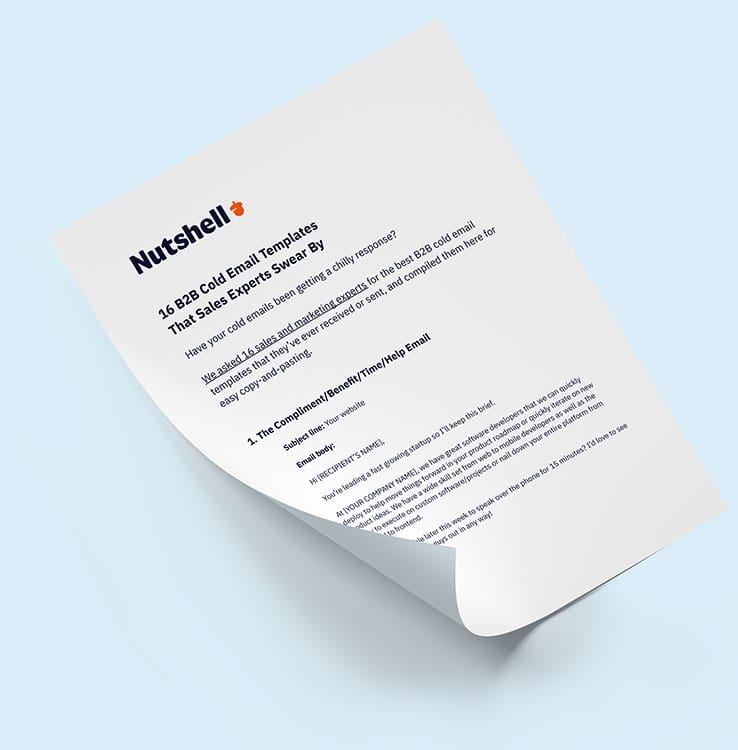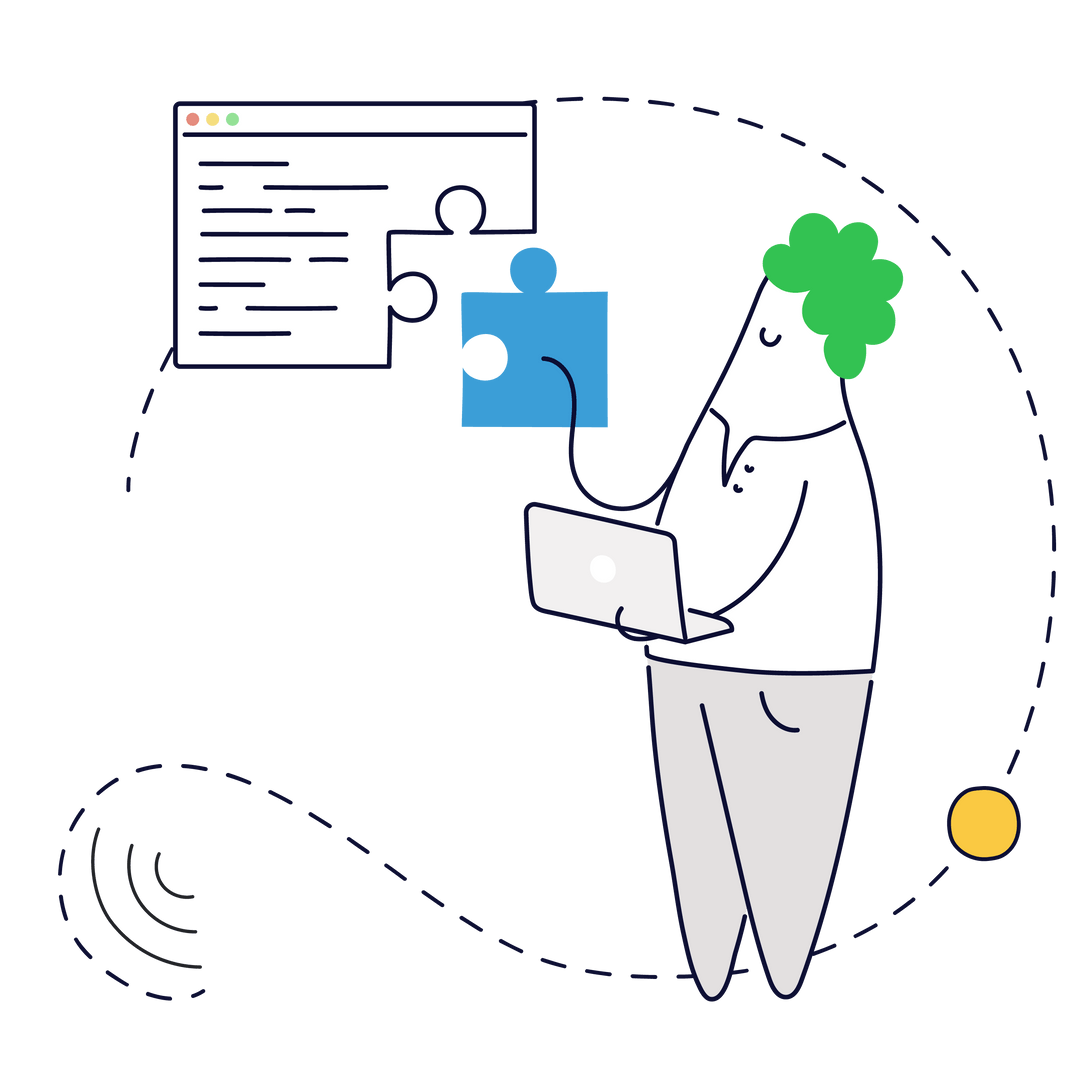
Consulting-focused CRMs deliver niche value—like client engagement tracking and proposal workflows—but often come with limited integrations and higher price tags geared toward smaller audiences.
By contrast, general-purpose CRMs like Nutshell offer flexibility, lower costs, and robust integration capabilities—plus core features that consultants need, like pipeline management, automation, and client communication.
The takeaway? Choose a consulting-specific CRM only if you need specialized features and have the budget. Otherwise, a versatile, scalable CRM that grows with your business typically offers better long-term value.
When you’re running a consulting services business, a good CRM is a must to streamline your client acquisition process and keep a good balance between landing clients and delivering services. But should you use a consulting-specific CRM or a general-purpose CRM?
In this post, we’ll explain the difference between a consulting services-specific CRM and a general-purpose CRM, plus how you can choose between the two.

You may believe that CRMs are only good for large companies with hundreds of employees.
However, CRM is a helpful tool for businesses of all sizes. If you make sales, whether you sell products or services, an efficient sales pipeline will help you stay on track and manage your time and resources effectively.
Consulting CRMs are great for consultants because:
With those benefits in mind, it’s easy to see why a consulting CRM can help you sustainably scale your consulting business.
However, the question remains: Should you get a general-purpose CRM or one made specifically for consultants?
Our interactive worksheet compares the benefits offered by Nutshell, your existing contact management solution, and any other CRMs you’re currently evaluating.

Consulting services-specific CRMs were built to help consulting firms create and optimize their sales process. The features, integrations, and add-ons are specific to solving the sales issues of consulting firms.
So, should you use a consulting-specific CRM for your consultancy? Let’s take a look at the benefits.
Summarize this content with AI:
CRMs for consulting firms are valuable to users because they are specifically catered to your business model.
Advantages of consulting services-specific CRMs include:
Let’s look at those features in depth below.
A significant benefit of a consultant CRM is that it has an interface that consultants will resonate with.
That means that features that consultants will likely find more critical for their sales process will be put to the forefront.
Industry-specific language may also be used, so, as a consultant, you’ll probably feel right at home using a consulting services-specific CRM.

Consulting services-specific CRMs will be equipped with consulting CRM features that are helpful to consulting firms, such as sound follow-up systems and automated workflows.
Including these specific features may be at the expense of additional features you could find helpful for your sales process.
A general-purpose CRM has the capabilities of a consulting-specific CRM, but these features may not be as highlighted as they would with an industry-specific CRM.
Since consulting-specific CRMs host a minimal interface with only the features applicable to the industry, they often take a shorter time to set up. Conversely, general-purpose CRMs can take some time to install and get running.
However, the fast setup time does not apply to all consulting-specific CRMs. And some general CRMs can be set up faster than their industry-specific counterparts.
General-purpose CRMs are built with a broad range of businesses in mind, instead of being created for a specific industry.
These CRMs typically come equipped with universal tools and features that any business can easily use.

General-purpose CRMs offer significant benefits over industry-specific CRMs, and it pays to consider this when choosing a CRM for your consulting business.
Benefits include:
Let’s look at these benefits in detail.
General CRMs are built to appeal to a larger customer base, so the interface is designed with the general audience in mind.
Since these CRMs have a significant number of users sending feedback, it’s more likely that their software is consistently upgraded to be more user-friendly and meet demands.
An industry-specific CRM might not be as user-friendly or regularly updated as those catering to a broad audience.
Because general-purpose CRM software is made for a wide range of users in various industries, they have a more comprehensive range of integration options than their consultant CRM specific counterparts.
General CRMs are more likely to integrate well with most sales, marketing, and productivity software.
A general-purpose CRM may be a better choice if you’re already using software for your time-tracking, marketing, or invoicing.
Explore our current integrations and upcoming tools that will help you get even more out of Nutshell.
And get the inside scoop on Nutshell’s security policies here:

Finally, general-purpose CRMs tend to cost less than consulting services-specific CRMs. Since they target a diverse audience, they can scale their pricing as necessary, with multiple pricing tiers.
Industry-specific CRMs, on the other hand, attract a smaller audience, and their pricing is more rigid.
This is not always the case, as some consulting-specific CRMs are more affordable than popular general-purpose CRMs.
After you’ve assessed the benefits of consulting-specific and general-purpose CRMs, it can still be challenging to decide on the right one.
Which should you choose? That answer depends on your goals for your software and how you want it to help your consulting business grow.
Generally speaking, if:
then consulting services-specific CRM software could be a good choice for you.
Otherwise, a general-purpose CRM may be a better choice for your consulting business if:
If you’re looking for an affordable and user-friendly CRM solution for your consulting firm, consider Nutshell, an all-in-one CRM trusted by all industries – including consulting and professional services companies.
Nutshell is a general-purpose CRM made to help you close more deals and get more clients.
With sales automation, contact management, personalization, and more, Nutshell has features that will make you feel like it was created specifically for your industry!
Sign up – no credit card required – for our 14-day free trial of Nutshell to see what all the hype is about, or contact us today to learn more.
Most consulting businesses can get Nutshell up and running in 2-4 weeks. General-purpose CRMs like Nutshell are faster to deploy than consulting-specific systems, which often require 6+ months of customization. With Nutshell’s intuitive setup, onboarding support, and CSV import tools, you can start tracking leads and managing client relationships quickly.
Yes! Nutshell makes data migration simple with CSV import tools that work directly with Excel and Google Sheets. You can import contacts, companies, and leads in just a few clicks—no IT expertise required. Nutshell also offers white-glove onboarding support and data migration services to ensure your information transfers smoothly without disrupting your consulting work.
Solo consultants absolutely benefit from a CRM. Even with a smaller client base, a CRM helps you track follow-ups, nurture referrals, and maintain relationships—which drives 41% of new consulting business. Nutshell offers affordable plans scaled for solopreneurs, eliminating manual tasks so you can focus on billable work instead of administrative overhead.
Most consulting businesses see measurable ROI within 6-12 months of CRM implementation. Research shows CRMs return $8.71 for every dollar spent through improved conversion rates, shorter sales cycles, and time saved on automation. With Nutshell’s straightforward setup and sales automation features, consultants often experience productivity gains even sooner, particularly in follow-up management and pipeline visibility.
Essential integrations for consultants include email and calendar sync (Gmail, Outlook), proposal tools (DocuSign, Dropbox Sign), accounting software (QuickBooks), and meeting schedulers (Calendly). Nutshell offers dozens of native integrations plus Zapier connectivity, ensuring your CRM works seamlessly with the tools you already use. LinkedIn integration via LinkNut is particularly valuable for consultants building referral networks.
Give our powerful, easy-to-use CRM a try for free for 14 days! Or join a live demo to see Nutshell at work!


Join 30,000+ other sales and marketing professionals. Subscribe to our Sell to Win newsletter!